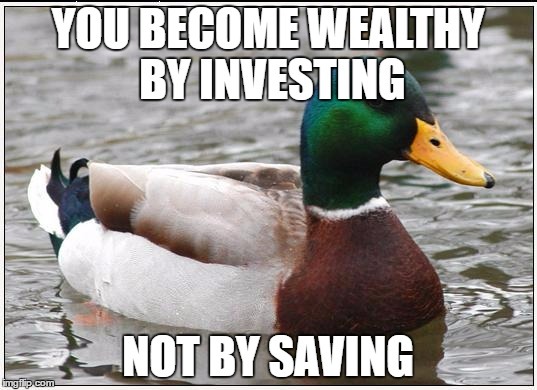Savings can be traced back to the 16th century, when people stored items and spare coins in jars and clay pots for rainy days.
Over time, however, savings gradually and progressively evolved to what it is today – local club savings (Ajo in Yoruba), traditional banking systems, and even digital savings.
According to Focused Financial, the modern investment structure can be traced back to the 17th century when the Dutch East India Company listed its shares on the Amsterdam Stock Exchange in 1602.
However, evidence shows that investments had long started before. One of these pieces of evidence is the Hammurabi Code, which dates back to 1700 BC and provides a legal framework for investing.
In a Wikipedia article, stocks, bonds, and other securities buyers were described as speculators in the media, academia, and commerce at the beginning of the 20th century.
At that time, investments, like the current financial markets, connected investors to businesses and helped them grow their wealth.
Saving in finance is putting money away in cash or its equivalent, after subtracting your expenses from your income over a certain period.
It is storing what is left of your money after making the necessary deductions, expecting little or no interests.
On the other hand, investing means buying assets or investing your money into ventures in hopes of increasing value and getting higher returns.
It is basically putting your money to work to earn more money for you. One of the things you could invest your money in include Eurobonds.

Eurobonds are bonds or debt instruments denominated in a currency other than the local currency of the country in which the bonds are issued.
They are the most common form of fixed income securities and one of the safest investments.
A bond denominated in Japanese Yen and issued in the UK, or a bond denominated in US dollars and issued in France or the UK are examples of Eurobonds.
Eurobonds are securities that are issued by the government or a company to raise the money needed to finance projects, without any form of forex risk. Investing in fixed income on Rise guarantees you 10% returns in dollars per annum.
Other forms of investing include stocks and real estate. You can start here.
How much money should you save or invest from your income? Well, according to the 50/30/20 rule by financial experts, 50% of your income should go into paying for those expenses that are essential to your survival like groceries, healthcare, insurance, taxes and other basic utilities.
30% is expected to go into your wants like buying that chanel purse, ordering from your favourite restaurant or organising a house party. While 20% is allocated to your savings or investment.
Here’s an example:
Yemi makes 500,000 naira monthly and following the above rule, 50% (250k) is expected to go into his essential needs; 30% (150k) into his wants; and 20% (100k) into savings or investments.
Although a brilliant budgeting rule, this may not be ideal for every earner as everyone has different needs and different earning rates. So how much you choose to save or invest is dependent on how much you make and your level of needs.
It is also important to note that despite being essential to building wealth and gaining financial security, both concepts are different and often used interchangeably.
While one helps you pile your money with little or no returns and with minimal risk involved, the other helps multiply your wealth, exploring various options amidst the risks involved.
As a finance enthusiast, bearing in mind the Naira’s rate of devaluation and the level of inflation around the world, it is crucial to understand the differences and similarities between savings and investments.
This way you can make the right financial decisions and take the right steps to growing your wealth.
One common similarity between savings and investment is that they are both strategies we can use to achieve our financial goals and secure our financial future.
Six major differences between savings and investment
Returns
Savings, compared to investments, have lower or no returns, especially in the Nigerian banking system where accounts, regardless of type, are often charged different minor fees. This sometimes reduces the total sum of a saver’s funds.
However, with the wide range of options that investment offers and the possibility of diversification, higher returns are expected.
Devaluation
While investments offer a hedge against currency devaluation and inflation as their value primarily increases, a currency’s value drops as inflation skyrockets. This, in turn, reduces the value of your savings.
Purpose and Duration
Why are you saving or investing? Are you targeting a specific goal? How long do you want to do it? It is crucial to identify your objectives before deciding whether to invest or save.
Although both are goal-based, savings are better for short-term, specific and straightforward goals. They are targeted towards easy goals, irregular spending, and emergencies, as they are easier to meet.
To achieve a long-term goal, investments are the best fit. They meet bigger financial goals while promising you higher returns.
Risk
Savings come with little or no risks. This is because they are often deposited into bank savings accounts or fixed deposits.
Local savings systems like the Ajo and piggy banking are also relatively safe, as there is a level of trust and prior relationship among the community of savers.
However, there is a higher risk of losing money with investments, as they depend on market situations and fluctuating return rates.
These risks are even higher when an investor fails to invest in quality assets with long-term growth potential.
In addition, you could lose your capital in investment, as there is often no guarantee of possible returns. However, the higher the risks involved, the higher the returns.
Diversification
Investments offer various options like stocks, real estate, crypto, gold, bonds and mutual funds.
These allow investors to earn from different sources and shield them from harsh market conditions. When one investment option is down, the other is up or doing reasonably well. Savings, however, have limited options.
Access to Funds
In times of emergencies or urgent needs, it is easier to access savings, as they are liquid.
You have access to them and can withdraw at any time, although this could incur early withdrawal charges.
While this is a good thing, it leaves your account prone to withdrawals at any time, leading to unplanned and unnecessary spending.
On the other hand, investments do not allow easy access to your money, especially when the markets are neck-deep in loss. This helps investors examine their spending and stay on track with their goals of building wealth.
Summary of the key differences between Savings and Investment
| Key Differences | Savings | Investments |
| Returns | No or low interest rates | Relatively higher returns |
| Devaluation | Does not provide a safety net against devaluation and inflation | Provides safety net against devaluation and inflation |
| Purpose and Duration | Short term and short-term, specific goals | Long term and long-term goals (two years or more) |
| Risk | Little to no risk, as they are often deposited in banks and fixed deposits or using the local savings systems | Risk level varies according to the investment option. |
| Diversification | No diversification option | Allows diversification across different investment options |
| Access to funds | Savings are more liquid | Investments are less liquid |
| Options | Bank savings account, piggy bank, local collective savings (Ajo) | Stocks, real estates, mutual bonds, crypto and NFTs |
Savings and Investment, Which Should You Choose?
Should you be saving or investing? Knowing all the above, and having a defined vision of what you want to achieve helps you to make better money decisions.

However, whether it is saving or investing you have chosen to do, Rise has you covered.
Risevest has three asset classes for people who are looking to invest. There are stock, real estate, and fixed income options.
There are also goal-based plans for people who want to allocate funds towards a specific goal; dream wedding, travel, school, owning a home, rent, and even saving for your kids’ trust fund.
But remember, savings are targeted towards short term goals while investments are for the long term.
Savings do not yield much returns whereas, investments often provide higher returns, despite the risks involved. And the higher the risks, the higher the returns promised.
You can only achieve financial freedom and create the wealth you dream of by investing. Start here. To be a good investor, here are some things you need to know.